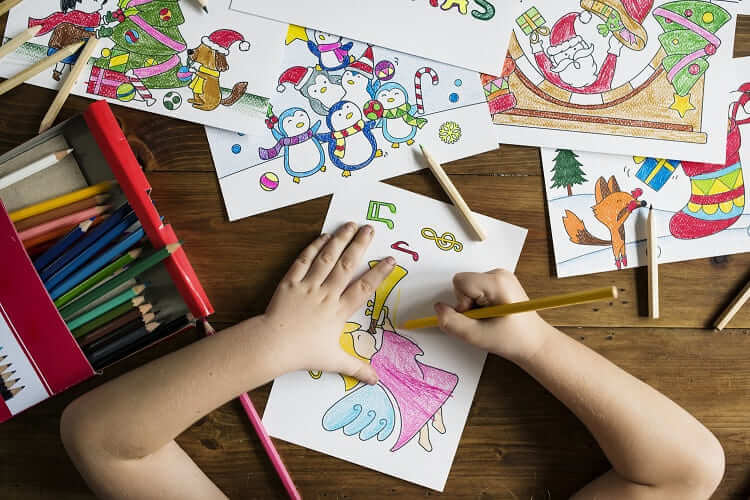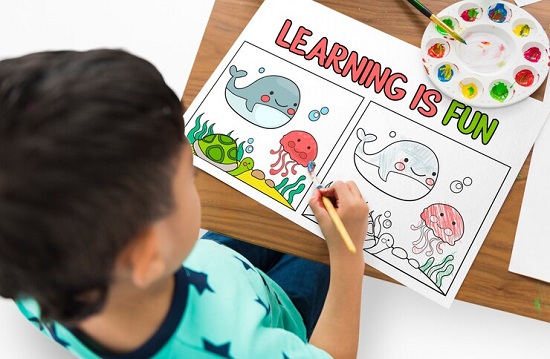Spring Season Drawing for Kids: Know Some of the Creative Drawings Ideas for Kids to Make it Fun


Spring is one of the most beautiful periods of the year, and it’s ideal for outdoor activities! However, there are days when you’re trapped at home, or when it’s time to get busy in the classroom, and you just need some fantastic DIY ideas.
With the weather starting to warm up, it’s time to get creative with these fun spring crafts and arts for kids – a collection of ideas for kids of all ages to get your creative juices flowing.
Learning courses for your kids! Get free trial here
Also Read: Is Learning Dependent on Cognitive Development? Guide to Better Development
Spring Season Drawing for Kids


Spring is one of our favourite seasons! It’s when the weather turns intriguing and vibrant, flowers bloom, and people become more animated. It’s a great time of year to focus on some of the more intriguing study areas, such as flowers, bugs, frogs, weather (particularly rainbows), and more!
You’ll discover a wide range of projects for all ages in this collection of spring crafting project ideas, including incredibly basic projects for toddlers and preschoolers, ideas that fit well with kindergarten themes, and crafts that school-aged children will appreciate.
Spring Season Drawing Ideas for Kids
Giant 3D Watercolor Flowers with Paper Plates
Materials:
Watercolour paint palette
Uncoated paper plates
Brushes (If using watercolours)
Stapler or glue
Markers, crayons, chalk markers, or oil pastels (for added embellishments)
Instructions
Flower petal forms should be cut out.
Begin by cutting a variety of floral shapes from paper plates in progressively smaller sizes.
Petals should be stapled or glued together. Then, in the centre, staple or glue them together.
Use watercolours to create your masterpiece.
Now use watercolour paint to paint the flower petals and stems.
Add more embellishments!
Finally, if desired, add extra sketches to your flowers before or after painting them. Over the dry paint, we used chalk markers to create a gorgeous effect.
Flower Printing with Liquid Watercolors
Materials:
liquid watercolours.
blank stamp pads(or make your own)
Watercolour paper or other sturdy paper
Instructions
To prepare our stamp pads, squirt them with the liquid watercolour colours of choice to soak them.
Tell your children to pick flowers and leaves for printing in the garden.
Then press the flowers and foliage into the watercolour stamp pads, then onto the prepared watercolour paper.
They are more impressionistic than scientific, and the flowers and foliage are not depicted in minute detail. But they’re lovely, and the kids seem to like them.
Another advantage of these stamp pads is that they may be reused. As the ink dries, spray additional liquid watercolour on top.
Also Read: What are Coding Classes for kids? Importance of Computer Coding Lessons for Children
Spring Activities for Kids
Making Bubble Liquid
Blowing bubbles is a popular pastime among children of all ages. Making them yourself with a few items you probably already have on hand is even better than blowing them. You only need water, dish soap, and glycerine to make your bubbles. Play some bubble games in the backyard once you’ve made a batch.
For example, try the bubble pop freeze dance, in which players pop as many bubbles as they can before the music stops and they must freeze. Anyone who does not freeze will be eliminated until just one player remains. Alternatively, try bubble tag, in which the “it” player must tag another player by blowing a bubble that touches them.
Build a Birdhouse
Birds return to the countryside in the spring, looking for sites to nest. As a result, building a birdhouse with your children is the ideal spring project. There are many different ways to build a birdhouse to suit your taste and skill level.
To make things easier and a little smart work, several craft stores provide birdhouse kits that include all of the materials and straightforward directions you’ll need.
Grow Vegetables
Bring the kids to a garden centre and let them choose a veggie to plant, grow, and consume. Teach children how to take care of the plant and make it their spring project.
Look out for some entertaining recipes that use the product as the main ingredient once they’ve harvested their vegetables. Make a dinner that your children can help you prepare.
Spring Treasure Hunt
What can you see in the spring that you wouldn’t see the rest of the year? Maybe it’s the spring pinecones or the blossoms that have been exposed by melting snow. Make a list of the things that nature delivers and gives in the springtime with the kids.
After that, go on a scavenger expedition outside and grab the things. Make it more fun and make it a competition? Make two or more lists, divide them into teams, and race to see who can get everything first, from the list.
Party in Rain
Spring is famed for its flowers and brightness, but it also has a fair share of wet days. Don’t let the wetness of the season get you down. Instead, hold a rain-themed party to commemorate the wet weather.
Serve drinks with miniature paper umbrellas in them, for example. Also, serve rainbow-themed food, such as a colourful fruit buffet or rainbow-frosted cupcakes.
Preparing Gifts for Mothers’ Day
Spring is a beautiful time to go outside and snap pictures. Make it a game for the kids to find the greatest spring backdrop for a family photo shoot. Then have your kids print the photos and use them to construct scrapbook pages or framed photos as Mother’s Day gifts.
Drawing Ideas for Kids
Also Read: Reading Activities for Kids: Why Reading is Important for Kids
Zebra Hearts
While a watercolour background makes these patterned hearts stand out, you could simply skip the painting and simplify the project to a black-and-white design (and avoid the mess) or fill in the doodling with crayons or markers.
If you’re unfamiliar with Zentangle drawing, it’s a technique that focuses on a repetitive structured pattern to help the artist relax, which can be especially useful for children. There are a plethora of internet tools available to help you get started with Zentangle art.
Doddle Art
Try this creative doodle art if you’re searching for a really simple drawing project that will keep your tiny painters entertained for hours. Use a strong black marker to make a single-line scribble/swirl, then fill each organically produced shape with a different texture, colour, or pattern.
Exquisite Corpse Group Drawing
Don’t be put off by the grim name of this popular sketching activity; it’s perfectly suitable (and a lot of fun) for kids. You can use a template to get started with this group drawing, but folding a simple sheet of paper would suffice. Encourage kids to go outside the box with this one to come up with some genuinely unexpected personalities.
Observational Drawing
Teach this simple optical illusion method to kids to help them understand how to make three-dimensional art. Make sure to deepen each colour’s boundaries to produce that dynamic, moving effect (this is a great activity to emphasise the importance of shadows and highlights in drawing as well).
Blind Contour Drawing
This practice can be unpleasant at first, but it is also highly valuable to new artists—it can assist determine any preconceived notions, especially in portraiture. Make this a game by having a second person guess what the blind artist is trying to draw.
Rainbow Scratch Art
Kids can make original scratch art with just regular crayons. This exercise requires a sturdy sheet of drawing paper that can withstand two layers of crayon and a scratched-in image (try an open paperclip for an easy scratching tool).
One Point Perspective Scale Drawing
This enjoyable drawing appears impressive once completed, but it is pretty simple to complete. Make sure you have a ruler handy—perfectly straight lines are the key to establishing a one-point perspective illusion. Ask kids to spell a word (or their names) using a single-point perspective instead of making random shapes for a fun challenge.
Hand Tracing Drawing
These inventive tracing ideas can help kids get their imagination flowing and are a far cry from the tried-and-true hand-traced turkey. A hand outline is the ideal blank slate template for an innovative drawing, from filling with a pattern to creating an optical illusion.
Sticker Drawing
Allow children to choose a sheet of stickers, scatter them around a blank sheet of paper, and then draw to finish the scene. When your child artist has completed drawing, have them create a tale to go along with it.
Conclusion
We hope that this article has provided you with some ideas for how to help your children expand their creativity, knowledge, and understanding. Every parent hopes to see their child excel in all areas of life as they grow up. You may help your children learn immensely by allowing them to draw.
They can learn about some more fun activities, and how to enjoy them. If you’re seeking a place to help your child develop holistically, go to the Real School Of Montessori website. The articles on the website have the potential to positively affect and grow your children in all areas.
Experts advise and coach the children on how to proceed in the appropriate direction. Additionally, various types of articles provide children with unique and relevant knowledge in a more effective manner.
The articles on the website about drawings for various occasions, IQ testing and development, questions from many fields, mental capacity improvement, and everything else will be extremely beneficial to your child.
Also Read: Pongal Drawing for Kids: Let’s Build Creative Features in Children with Overall Knowledge!
Learning courses for your kids! Get free trial here
Recent Posts
What are the Advantages of Online Teaching at The Real School?
In the article -"What are the Advantages of Online Teaching at The Real School?" we…
What is the Full Form of School?: Unveiling the Acronym
The term "school" carries profound significance in the realm of education, representing more than just…
What is Math Full Form?: Cracking the Code
Mathematics, often referred to as "Math," is a subject that elicits various reactions from students…
What is Full Form of Homework?: Decoding Academics
Homework, an integral part of the academic journey, often raises questions about its purpose and…
What is Full Form of Teacher?: Demystifying Education
In the intricate tapestry of education, teachers stand as the pillars shaping the intellectual and…
What is Real Education?: Discovering Its Essence and Impact
The concept of real education is evolving, transcending traditional views that equate it solely with…

